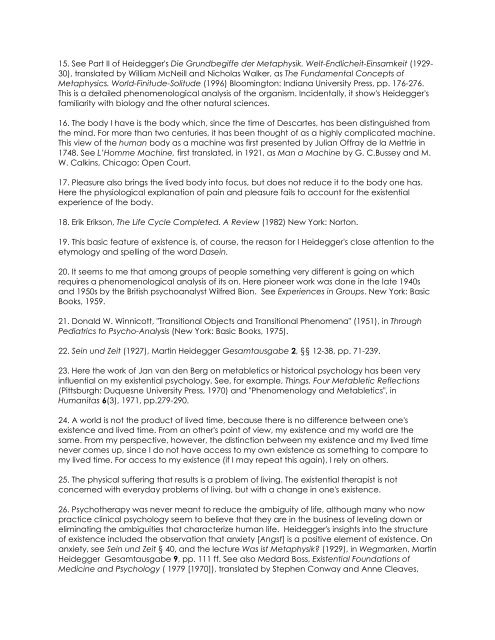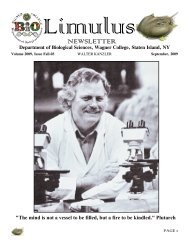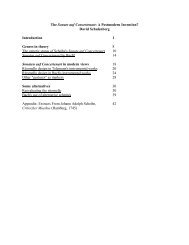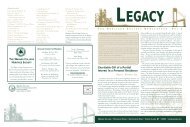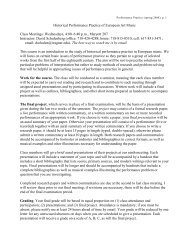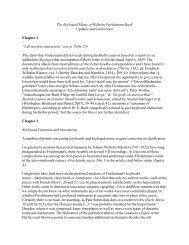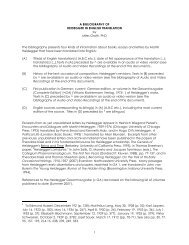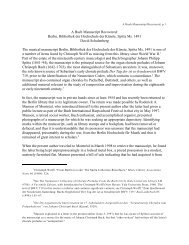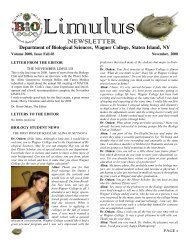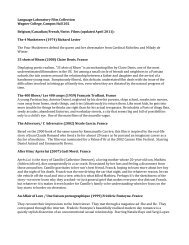SEVEN PAPERS ON EXISTENTIAL ANALYSIS ... - Wagner College
SEVEN PAPERS ON EXISTENTIAL ANALYSIS ... - Wagner College
SEVEN PAPERS ON EXISTENTIAL ANALYSIS ... - Wagner College
Create successful ePaper yourself
Turn your PDF publications into a flip-book with our unique Google optimized e-Paper software.
15. See Part II of Heidegger's Die Grundbegiffe der Metaphysik. Welt-Endlicheit-Einsamkeit (1929-<br />
30), translated by William McNeill and Nicholas Walker, as The Fundamental Concepts of<br />
Metaphysics. World-Finitude-Solitude (1996) Bloomington: Indiana University Press, pp. 176-276.<br />
This is a detailed phenomenological analysis of the organism. Incidentally, it show's Heidegger's<br />
familiarity with biology and the other natural sciences.<br />
16. The body I have is the body which, since the time of Descartes, has been distinguished from<br />
the mind. For more than two centuries, it has been thought of as a highly complicated machine.<br />
This view of the human body as a machine was first presented by Julian Offray de la Mettrie in<br />
1748. See L’Homme Machine, first translated, in 1921, as Man a Machine by G. C.Bussey and M.<br />
W. Calkins, Chicago: Open Court.<br />
17. Pleasure also brings the lived body into focus, but does not reduce it to the body one has.<br />
Here the physiological explanation of pain and pleasure fails to account for the existential<br />
experience of the body.<br />
18. Erik Erikson, The Life Cycle Completed. A Review (1982) New York: Norton.<br />
19. This basic feature of existence is, of course, the reason for I Heidegger's close attention to the<br />
etymology and spelling of the word Dasein.<br />
20. It seems to me that among groups of people something very different is going on which<br />
requires a phenomenological analysis of its on. Here pioneer work was done in the late 1940s<br />
and 1950s by the British psychoanalyst Wilfred Bion. See Experiences in Groups. New York: Basic<br />
Books, 1959.<br />
21. Donald W. Winnicott, "Transitional Objects and Transitional Phenomena" (1951), in Through<br />
Pediatrics to Psycho-Analysis (New York: Basic Books, 1975).<br />
22. Sein und Zeit (1927), Martin Heidegger Gesamtausgabe 2, §§ 12-38, pp. 71-239.<br />
23. Here the work of Jan van den Berg on metabletics or historical psychology has been very<br />
influential on my existential psychology. See, for example, Things. Four Metabletic Reflections<br />
(Pittsburgh: Duquesne University Press, 1970) and "Phenomenology and Metabletics", in<br />
Humanitas 6(3), 1971, pp.279-290.<br />
24. A world is not the product of lived time, because there is no difference between one's<br />
existence and lived time. From an other's point of view, my existence and my world are the<br />
same. From my perspective, however, the distinction between my existence and my lived time<br />
never comes up, since I do not have access to my own existence as something to compare to<br />
my lived time. For access to my existence (if I may repeat this again), I rely on others.<br />
25. The physical suffering that results is a problem of living. The existential therapist is not<br />
concerned with everyday problems of living, but with a change in one's existence.<br />
26. Psychotherapy was never meant to reduce the ambiguity of life, although many who now<br />
practice clinical psychology seem to believe that they are in the business of leveling down or<br />
eliminating the ambiguities that characterize human life. Heidegger's insights into the structure<br />
of existence included the observation that anxiety [Angst] is a positive element of existence. On<br />
anxiety, see Sein und Zeit § 40, and the lecture Was ist Metaphysik? (1929), in Wegmarken, Martin<br />
Heidegger Gesamtausgabe 9, pp. 111 ff. See also Medard Boss, Existential Foundations of<br />
Medicine and Psychology ( 1979 [1970]), translated by Stephen Conway and Anne Cleaves,


